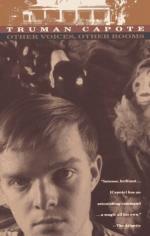|
This section contains 4,736 words (approx. 16 pages at 300 words per page) |

|
SOURCE: “Other Voices, Other Rooms: Oedipus Between the Covers,” in American Imago, Vol. 19, No. 4, Winter, 1962, pp. 361–74.
In the following essay, Mengeling discusses the Oedipal theme in Other Voices, Other Rooms.
Truman Capote's first and most widely acclaimed novel, Other Voices, Other Rooms (1948) germinated in a mind deeply concerned with the power of darkness. Heaped with dreadful psychologies and nightmare terrors, it comes near to resembling a Gothic romance, stylistically nocturnal in the best tradition. It is a complicated work of many motifs, themes and sub-themes, a work which in the fourteen years since its publication has fallen victim to a variety of critical interpretations best described as tenuous.
John Aldridge was the first critic of Other Voices to exploit the theme of a boy's search for a father. Aldridge also utilizes, and within limits he is correct, the parallel sub-theme of a boy's “struggle to grow out of...
|
This section contains 4,736 words (approx. 16 pages at 300 words per page) |

|


